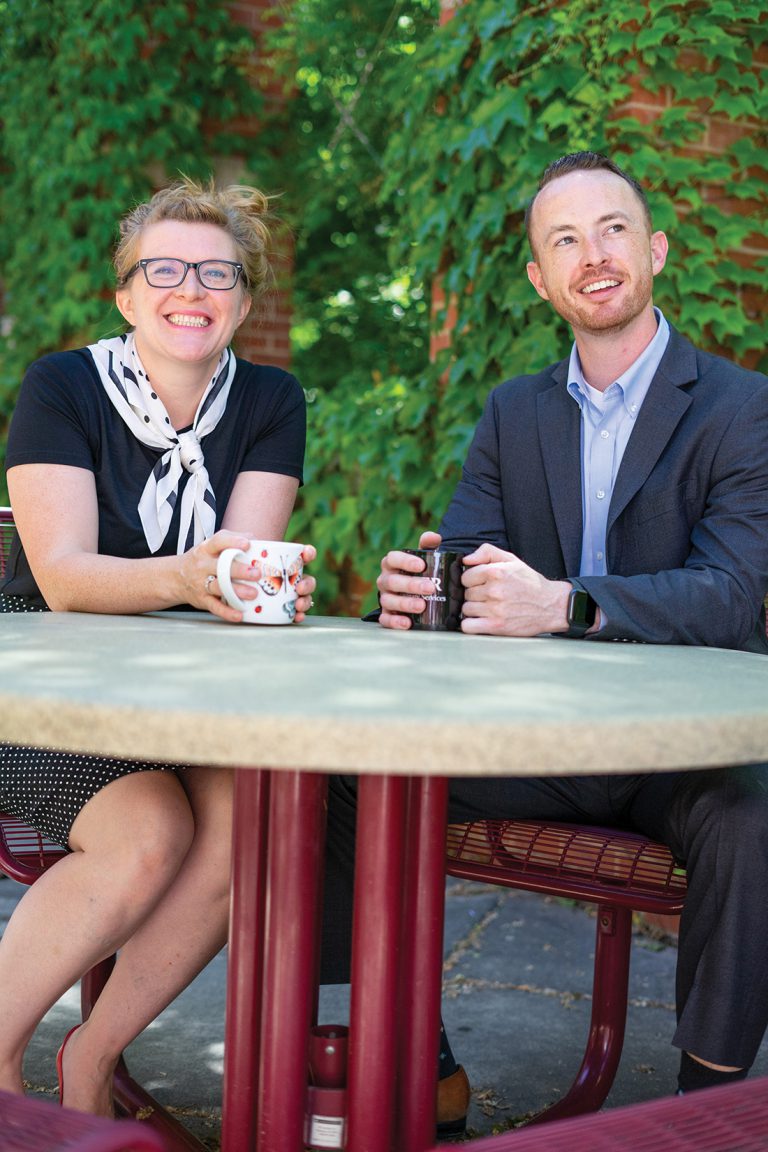
Breaking the Mold

Two veterans help civilians confront biases
by Johanna Droubay
Marine veteran Corbin Catmull (’17) says he was the last person on earth anyone would have expected to join the military. “I was really anti-authoritarian for awhile,” says Corbin, who has always resisted following a set path or meeting other people’s expectations. And when the expectation was that he would never commit to military service? He said, “I’m going. I’m all in.”
Corbin didn’t live up to the expectations many civilians have for members of the military. Right-wing? Conformist? Gun-loving? No. He didn’t fit the stereotype as a Marine, and he still doesn’t as a Marine veteran. But he isn’t the exception, he says. He’s the rule. “People think that the military is this specific, cookie-cutter molding system that creates a certain type of person. The reality couldn’t be more opposite.”
College classmates, neighbors, hiring managers, and acquaintances often make snap judgments about veterans’ politics, parenting styles, personalities, and mental health. And those assumptions create barriers between veterans and communities. Corbin says a painful irony lies in this division because if there’s one thing veterans have in common, it’s their desire to connect. “The thing that we all miss so much about the military is that sisterhood and that brotherhood we all had,” he explains.
This year, U.S. News and World Reportranked Westminster number 12 in “Best Colleges for Veterans – Regional Universities West.” But the college has had to work—and continues to work—to bridge the military-civilian divide.
“Since Trump, bias against veterans has exploded. People think we’re part of his club,” Veterans Center director Sylvia O’Hara says. “Conversations that I’ve been having now for almost eight years seem harder than ever before. But they’re the same conversations: veterans are people; we’re dynamic; we’re interesting; we all have different skillsets.”
Sylvia enlisted in the Army soon after 9/11, when she says she couldn’t go anywhere in uniform without being thanked. By the time Sylvia completed her service in 2008, the attitude had changed. “By then people were already exhausted. They would say, ‘Are we still there?’”
At Westminster, Corbin says, “When I first got here, the question I got a lot was, ‘So did you shoot anybody?’” Corbin, who never deployed, says blunt questions like this one show a lack of understanding. “I think with any bias—whether it’s related to the military, ethnicity, sexual orientation, or any sort of group—when questions are that narrow-minded, it shows that people don’t really know members of that community.”
As a student worker, Corbin helped Sylvia build the Veterans Center from the ground up. The center opened in 2015 as a place for veterans to connect with each other and with the campus community. “We have all sorts of different programming that encourages students to come in and feel comfortable on campus,” Sylvia says. “The more comfortable they are on campus, the more likely they’re going to share their story. And the more likely that they share their story, the more likely people are going to stop dehumanizing them.”
Corbin’s own story is full of complexity and dashed expectations. The rebellious 20-year-old who joined the Marines in 2010 knew that enlisting would mean pushing himself to the limit and almost certainly deploying. But during his combat training, the mother of his three-year-old daughter died suddenly. He was moved to a unit where he wouldn’t have to deploy, which was a blessing for Corbin as a father, but more complicated for him as a Marine. He says, “I felt like I didn’t get the opportunity to serve exactly the way I wanted to.”
Working at the Veteran’s Center while he was a student gave Corbin the opportunity to serve the veteran community in a meaningful way. His unique experience positioned him to be especially dedicated and thoughtful in that role.
Sylvia hopes that as Westminster faculty and students study systems of oppression, they will also consider the struggles that veterans face and the systems that created the wars we fight. “Veterans often see war as a societal problem,” she says. “Civilians see war as a military problem. The disconnect acts as a barrier to progress and understanding.”
It can be exhausting for veterans to advocate for themselves and volunteer their stories, especially when they don’t know how those stories will be received.
Sylvia says, “I see this all the time where a veteran shares a story, and you can tell that it was just too much for the other person. And there’s not an emotional connection that says, ‘That was hard, or brave, or I’m sorry that you had to do that or see that.’ There is a tendency to gloss over it and say, ‘Do you want to go get lunch?’”
Perhaps if Americans are truly tired of the wars we are fighting, we should listen more carefully and compassionately to stories of war. “If somebody has been to war,” Sylvia says, “they might have an insight society needs to hear.”
About the Westminster Review
The Westminster Review is Westminster University’s bi-annual alumni magazine that is distributed to alumni and community members. Each issue aims to keep alumni updated on campus current events and highlights the accomplishments of current students, professors, and Westminster alum.
GET THE REVIEW IN PRINT STAY IN TOUCH SUBMIT YOUR STORY IDEA READ MORE WESTMINSTER STORIES